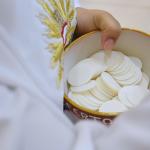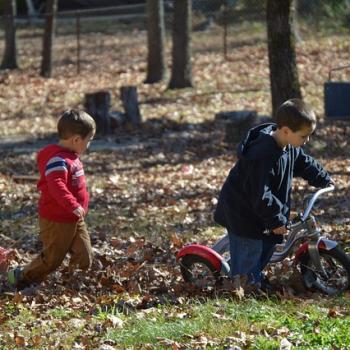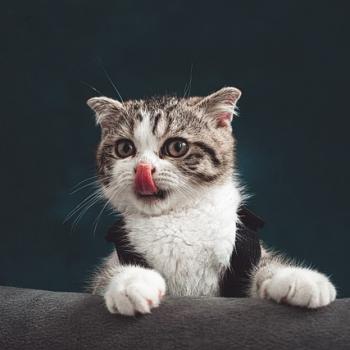
I went to run errands with Adrienne.
It was the Nativity of the Virgin Mary, a feast I’ve never known how to celebrate even in good years– and especially not this year when I am permitting myself to question everything. The people who hurt me most in all the world have been devoted to the Virgin Mary. I never know what to say to her. I didn’t know what to say today either.
The stalking neighbor who harassed us for seven years, and who miraculously has not bothered us since June, emerged from her house to mow her lawn. Mowing the lawn is her favorite chore. She used to mow the lawn every three days, stimming back and forth across the small yard again and again for hours, spending an extra long time under our windows muttering threats. After that she’d run across the street to talk to our other neighbors and stand there waving and ranting across from my door for another hour, so that if I had to go anywhere I would need to flee out the side door and run up the alley. Now, she only mows once a week. She finishes the job quickly and runs inside, and she doesn’t yell or threaten under the window.
Still, just hearing the mower nauseates me.
I waited until she was done mowing to take Adrienne out to the car’s hiding place, where we’ve kept it for a year so the neighbor will think we don’t have one. The last time I tried to park on my own block, she slashed the tires and the police expected me to come up with my own witness. And that was why I was sitting at home, waiting around, when I saw that the Queen of England had died. And I felt a touch of vertigo.
All I could think was that when I was a little girl, I read books and watch television from England from a generation ago, and it always struck me as odd that the person the old-fashioned people were referring to as “the queen” was the same queen who currently lived there. And when I read Adrienne the same books and showed her the same television, I told her that “the queen” was still the same queen, the longest reigning monarch in British history. And now that queen is gone. There’s a king in England. If I have any other children, or if I have any grandchildren, they will enjoy the same books and television, but for them “the queen” will be someone who is in the past. This is what is meant by the end of an era.
All of those thoughts and then some were jumbling in my mind as I finally took Adrienne to run our errands: the Queen whose birthday it was, the queen who had just died, the madwoman next door, my daughter’s eleventh birthday in less than two weeks, the family of angry aunts I’d never see again, what I would do if one of them tried to write to Adrienne on her birthday. A crowd of women from all walks of life, jostling for my attention.
We went downtown to the post office to have the mail held, because tomorrow we are going out of town to dog sit for a friend. Then we went up town to get bottled water for our trip, and with the last of the day’s money we took the Neighborhood Trolley for a bath at the car wash. As we went we talked about the day’s news.
“I saw the queen on television when I was your age,” I said. “My mother liked to read about the royal family and when Princess Diana died– that was King Charles’s first wife and they got divorced, it was a scandal, princes aren’t supposed to get divorced– anyway, she died in a car crash, and everyone watched her funeral all over the world. And my mother made us watch it. She said it was history that we’d remember the rest of our lives. And then the queen got on television and gave a live speech. Even though they hated Diana.”
Adrienne opined that that was a nice thing to do.
I didn’t add that even at twelve years old, I thought the queen looked cold and angry to be giving the speech. I didn’t know the half of it.
I didn’t add that that night, my mother let us watch a documentary about Princess Diana because she said it was a history lesson. I watched as Diana gave speeches and waked around in beautiful dresses, looking royal. I watched her talk with Mother Teresa, who herself had died the day before. I watched her walk into an AIDS hospice and shake hands with a man in a wheelchair.
My mother had told us that AIDS crossed the species barrier because of the licentiousness of gay people, and that it was a disease for gay people. I can’t even describe how much everyone I knew hated LGBTQ people. They were the enemy of all that was good and decent. Meanwhile I was madly in love with my best friend Julia, but didn’t have words to say what I felt. I had never seen an out of the closet LGBTQ person before. So when Princess Diana shook hands with the AIDS victim on the video, my first childish thought was, “Wow, gay people are pale.”
I’ve often wished I could thank her for that: for being the very first person to let the cat out of the bag to me that LGBTQ people are human.
I am told that the queen told Diana to stop drawing attention to AIDS victims, but to talk about “Something more pleasant.”
I wonder, if I happen to die before my mother and grandmother do, if they’ll look as cold as the queen did and try to say something nice.
That was the memory that played again and again in my mind, as I drove my daughter up and down town on errands at the end of an era. Not really a memory of the person who had died, but memory occasioned by it.
That’s what I’m thinking of right now.
image via Pixabay
Mary Pezzulo is the author of Meditations on the Way of the Cross, The Sorrows and Joys of Mary, and Stumbling into Grace: How We Meet God in Tiny Works of Mercy.













